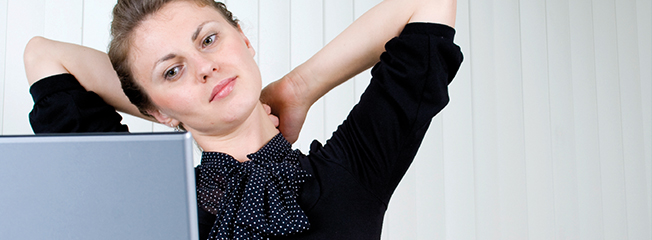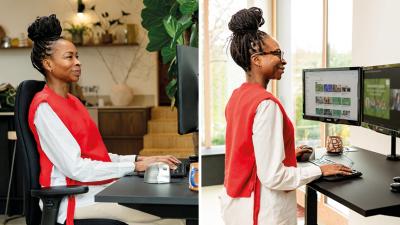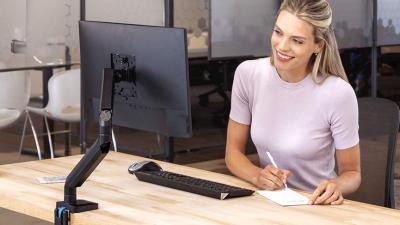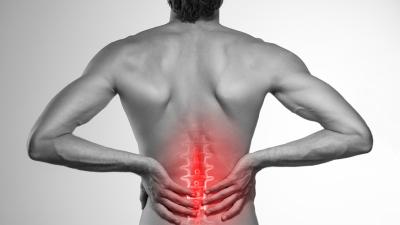
Feel tired constantly at work?
We all need sleep, along with food, water and oxygen to survive. In fact, we spend up to one-third of our lives asleep.
Although most of us know that getting a good night’s sleep is important, we still struggle to make those 8 hours or so snuggled under the duvet a priority. The busy pace of modern life complicates our sleep patterns.
The average Brit works 8 1/2 hours a day, plus an additional 2-3 hours of work from home during the week or whilst commuting. Not to mention trying to find time for family and socialising before you crash down on the sofa at 10.30pm to catch Gogglebox. Before you realise in less than 7 hours you will be heading off to the office again.
Stimulants such as coffee and energy drinks and too much screen time - checking our emails, Facebook or Twitter after the lights out - can also interfere with our sleep cycle. Not getting enough sleep can have a negative effect on our health & wellbeing as well as making us unproductive and too tired to focus as work.
So what can you do to improve your sleep, and feel less like an office zombie?
Here are our top tips on keeping up a good work – sleep pattern.
It all starts with a healthy breakfast
Although it seems an obvious place to start for some, for many of us still breakfast is something that is only for the weekends or those who have time to have it.
We recently saw in our Twitter breakfast week survey that it was a 50:50 split between those who do manage a health breakfast and those who just do not have the time due to commuting. Breakfast fuels our bodies and increases our endurance, which is why it’s important to not get in to the routine of skipping breakfast or you may find that you hit a mid morning slump due to needing a bit of an energy boost – that and it will stop your tummy rumbling in morning boardroom meetings!
Why not start up a breakfast bar for your staff? It can be as simple as setting up an area in the kitchen or lunch room with seating, magazines and a selection of fruit, oats, juices, nuts, muesli, whole-wheat breads and yogurts. Not only will this help out individuals who are too busy to eat in the mornings but it will also encourage everyone to make healthier choices.
Get on your feet
We are not talking about hitting the gym here for a 2 hour session before work. Doing too much exercise will wear you out and expend the energy you need to keep going. But by doing small amounts of exercise during the day you can help keep your blood flowing and help keep you alert when you are feeling a little tired.
We have mentioned many times before that sitting down all day is bad for us and that it’s all about keeping up a balance between sitting and standing during the day.
Using a sit-stand desk allows you to switch between sitting and standing easily and has been proven to boost productivity and the overall health of employees.
If a sit-stand desk is not an option why not try any of these active working ideas:
- workstation exercises
- get out the office and go for a walking meeting
- or if you prefer indoors, a standing meeting
- going green & walking or cycling to work
It is after all, much harder to fall asleep on your feet.
Keep a watch on how much you eat
Reaching for the biscuits at your desk between lunch & home-time? We are not complete saints here at Posturite either and are impartial to a biscuit or two here and there during the day, but it’s a good idea to not make constant snacking a habit.
Being in a food coma 5 days a week and over-eating will make you feel more tired and lethargic. Rather than waiting for your stomach to give you a signal that you are full, pay attention to the food you put on your plate. Only eat as much as you need and drink plenty of water to keep hydrated. You need to eat just enough to provide your body with the energy it needs to get through the day.
Put the caffeine down!
Ah coffee.
Latte, cappuccino, those fancy Nespresso shots; the coffee market is another thing that has grown almost as quickly as the technology in the last 20 odd years. There are 3 Starbucks coffee houses straight outside the Great Pyramid of Giza!
Coffee, although a nice tasty and enjoyable drink, is also nowadays substituted as a quick energy shot instead of sleep which is not good.
Caffeine is what most people use to stay awake when tired, but overuse can lead to problems such as headaches, poor sleep at night (due to having much caffeine in your system) and even muscle spasms and dehydration.
If coffee is your morning pick me up, start your workday with a reasonable amount of the stuff (around 65-100mg). This can help prevent you from feeling more and more tired as the day goes on. This is because your active brain is constantly producing adenosine as a by-product of its activity. When your adenosine levels are high enough, your brain knows it's time to get some rest.
Caffeine can, essentially, impersonate adenosine and bond with its receptors, putting off your brain's job of letting you know it's time to sleep. Try not to drink it after 2pm on your working day to avoid this. Don’t forget that tea also contains caffeine and should be drunk in moderation too.
Better still, go coffee and tea free and head to your water cooler machine. Not only will you find you feel more hydrated than usual, you will also get bonus points for leaving your seat and walking there.
Become a power nap ninja
Did you know Leonardo da Vinci, Albert Einstein and Thomas Edison were all avid power nappers?
If you really are struggling to get some good night’s sleep it may be worth trying out having a 20 minute nap during your workday.
It’s important to make sure that you nap at the right time of day – say between 1pm to no later than 3pm so that you don’t ruin your sleep schedule. Napping has been proven to boost your cognitive ability and will make you feel more alert during the afternoon.
Some of the main benefits of power napping include improving alertness and memory retention, sharpening motor skills and increasing stamina. Nasa Sleep researchers have found that a nap of just 26 minutes can boost performance by 34%.
Google and Nike have created facilities for employees to use at work when they need to get some rest, complete with beds, couches and soothing music.
If you want to head out of the office and a tired Londoner, you may want to check out the sleep spa on your lunch hour - Spa InterContinental on the first floor at the InterContinental Hotel Park Lane.
Hopefully, these tips will give you a start on how to survive the working day if you are exhausted. If you are still finding that you are exhausted at work and feel it is more due to your workload stress instead of general fatigue, do speak to your boss and let them know that you need additional help with your daily role.
For extra advice, check out our latest webinar video – The importance of sleep to wellbeing.











